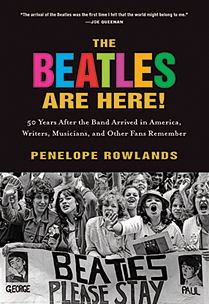Ed Sullivan, by all reports the squarest man in television, likely had no idea what he was unleashing upon the world when the Beatles made their first live American TV appearance on Feb. 9, 1964. Sure, the CBS host had a knack for spotting talent—and was on the hunt for the next big thing ever since he let Elvis slip through his fingers—but the psychic impact that John, Paul, George and Ringo left on America’s youth would never be equalled. Or so we’re constantly told in Rowlands’s new anthology, billed as a “scrapbook of madness” in which musicians, writers and fans recall the hysteria of the Fab Four’s arrival on U.S. shores.
On the book’s cover is an indelible image of a screaming, teenage Rowlands—along with four other Beatle-stricken girls—which appeared in the Sept. 21, 1964, New York Times. After she dug up the photo to write about her Beatlemania days for Vogue a few years ago, the picture’s other subjects contacted Rowlands to reminisce, and the women’s essays—some bursting with still-youthful glee, others tinged with late-life sadness—form the beating heart of the book. As each fan recounts her passion for the group, and the near-blinding light they shone on a nation darkened by the JFK assassination, it’s easy to believe Rowlands’s insistence that no band will ever—ever!—equal the magic of the mop-tops.
It’s a shame, then, that Rowlands doesn’t dig deeper into her one-time fans-in-arms, as the rest of the book relies unevenly on big-name artists (Billy Joel, Cyndi Lauper) with not much to say, and novelists (Pico Iyer, Carolyn See) with scattershot memories. Even more disappointing is that most of Rowlands’s marquee subjects were not interviewed for this collection; their remembrances have been taken from previously published material. It’s a bizarre tactic—clearly intended to boost sales—that only succeeds in watering down the real stars of the book: the boys from Liverpool. Still, more than enough passages drip wet with rabid fandom, perfectly conveying the delirium of the day that was stifled until that point by sleepy love songs and the Dave Clark Five. As Rowlands writes, “We were so primed to scream.”
Barry Hertz
Visit the Maclean’s Bookmarked blog for news and reviews on all things literary.
